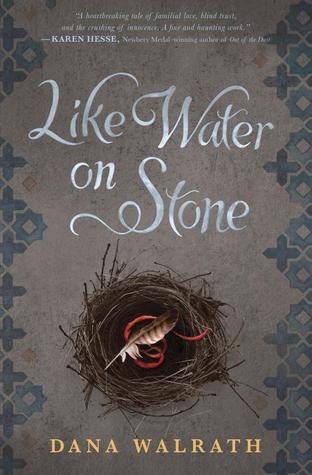
Like Water on Stone
By Dana Walrath
Published 2014 by Delacorte Press
The Ottoman Empire is falling and Shahen and his family are caught in the rubble. When the plan to eliminate all Armenians is set in motion, can Shahen's family find a way to survive?
I requested this e-galley because I'm a big fan of historical fiction and of novels in verse. I was particularly interested because the story is set in a time and place of which I don't know much. I expect the same will be true for many readers in the target audience.
I think the verse worked very well for this story. Often, I find myself thinking that true when the subject is a particularly terrible one - in this case, the genocide of a people. Telling such a horrific story in verse often allows readers some small breaks from the terribleness while at the same time using the fewest amount of words to capture a perhaps unimaginable horror. I think Walrath and her choice of narrators makes this even more effective. She includes two older children who are aware of the horrific events surrounding them (one more than the other) and the youngest child who can't comprehend exactly what is happening or why. And, above them all is the eagle, who can see all the events with even more perspective than the children. The eagle's narrative lends a bit of magical realism to the story and, at first, I was a bit unsure about it. By the novel's end, however, I was very glad for his voice's inclusion in the story.
Walrath also did an excellent job with her research. Every bit of this story (save the eagle's narrative voice) feels true and authentic. At times, it was easy to imagine that I was reading a true story of three children in the Armenian genocide. Walrath evokes the landscape vividly - I've never traveled to that part of the world, but Walrath's choice descriptions made it easy to picture the children's journey. Like many good historical fiction books, this one left me wanting to learn more about the period in which it was set. I'm saddened by the fact that I knew almost nothing about the Armenian genocide and, though it won't be pleasant reading, I think it's important to learn something.
My main complaint simply comes from reading the e-galley version - this made it difficult to refer back to the list of characters, so occasionally while reading, I would have a hard time remembering which character was which. With a print version of the book, this problem wouldn't exist, so it's a relatively minor complaint.
Thanks to the publisher for a digital advance reader's copy, provided via Edelweiss.
No comments:
Post a Comment